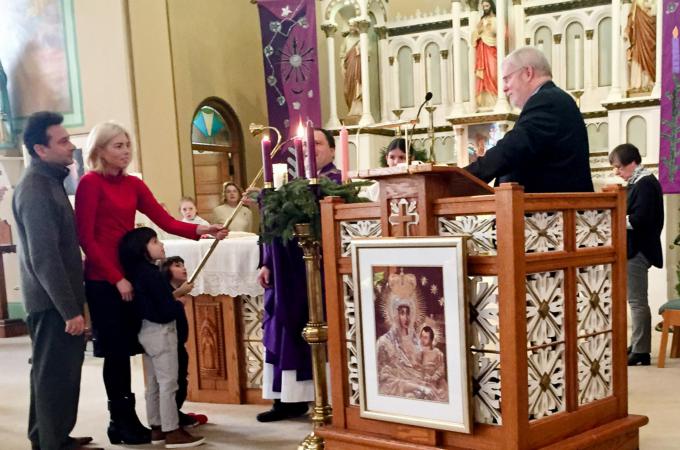Lithuanian Apostolate welcomes new structure, lay leadership
SOUTH BOSTON -- The archdiocese has created a new leadership structure for its Lithuanian Apostolate, which has traditionally been headed by the pastor of St. Peter Parish in South Boston. Following the reassignment of St. Peter's pastor Father Steve Zukas, parishioners Gloria Adomkaitis and Dr. Aldona Lingertat have taken on the positions of co-directors of the apostolate.
"This is very new, that laypeople are heading up an apostolate rather than a pastor," Lingertat told The Pilot Dec. 13. Lingertat is the Director of the Master of Arts in Ministry Program at the Theological Institute at St. John's Seminary.
"We're happy to do it because we care very much about the Lithuanian community and its Catholic heritage," she said.
Speaking to The Pilot Dec. 14, Adomkaitis said the leadership role is "like second nature" to her, since she already volunteers a great deal in the parish.
"It just continues what we've been doing all these years, maintaining our presence in the archdiocese and maintaining it in a meaningful and thoughtful way. It's another layer of responsibility or work, but it's nothing that I haven't done," Adomkaitis said.
The new co-directors said they hope to strengthen the parish's connection to the broader Lithuanian community, such as by collaborating with the Lithuanian Scouts and the Boston Lithuanian School in Milton.
"We're just trying to reach the different elements and encourage them to connect with the parish," Adomkaitis said.
Unlike Father Zukas, who is of Lithuanian descent, St. Peter's new pastor, Father Peter DeFazio, does not speak Lithuanian. Despite this, he is working with the apostolate to coordinate bilingual Masses so they can continue to pray and worship in their own language.
"The Lithuanian community has a strong history of being very committed to their Catholic faith, and that's important to continue," Lingertat said.
One of the co-directors' first projects was organizing a children's Mass, which took place on Dec. 9. Lingertat said it had "excellent attendance, great participation by the children."
The Mass was bilingual, with Father DeFazio speaking in English and the community responding in Lithuanian. Afterwards, the principal of the Lithuanian School gave a presentation on Lithuanian Christmas Eve traditions. The Lithuanian Scouts helped run activities and clean up after the children's Mass.
"We're just so happy to see the support and positive feedback from our community," Lingertat said.
Adomkaitis recalled how in 2004 St. Peter's Lithuanian Parish, the only remaining Lithuanian parish in the archdiocese, was on the list of parishes to be closed. She said the experience of almost losing the church prompted the parishioners to research the parish's history and "crystalized how important it really is to the Lithuanian community."
"I think it opened all of our eyes to how much the Lithuanian parish meant to us. So luckily we withstood the threat of closure, and 14 years later we're still here," Adomkaitis said.
The parish has been home to multiple generations of Lithuanian immigrants and their descendants. The first wave of immigrants came in the late 1800s and early 1900s. The grandparents and great-grandparents of some current parishioners helped build St. Peter's. In 1904 the community signed the property over to the archdiocese in order to receive the services of a priest. The second wave of immigrants came after World War II, and a third came in the 1990s after Lithuania declared its independence from the Soviet Union.
Today, Adomkaitis said, St. Peter's is mostly a "commuter parish." Very few members live in Boston, but they travel there from various surrounding cities.
"It's very important to us. It's not only our religion, it's not only what we believe. It's so intertwined, our theology with our culture," Adomkaitis said.
One way they maintain their traditions is through the Boston Lithuanian School, which was founded in 1949 to serve children of the second wave of immigrants. The 10-year program teaches Lithuanian literature, history, geography, music, folk dancing, and current events. Adomkaitis' two children attended Boston Lithuanian School and, as they have grown older, she said they have expressed gratitude for their time there, because they remain fluent in the language and "know that they are Lithuanian-American."
"Our community is not that large, but we're very proud to be Lithuanian," Adomkaitis said.
In addition to the children's Mass, the apostolate also held an Advent retreat for Lithuanian speakers and hopes to hold another retreat during Lent. The apostolate is currently planning a Christmas Eve Mass, during which children dressed as characters in the Nativity story will process and bring the baby Jesus to the creche.
"The bottom line is we're always going to try to enhance the experience of the Lithuanian Catholics in the archdiocese," Adomkaitis said.



















